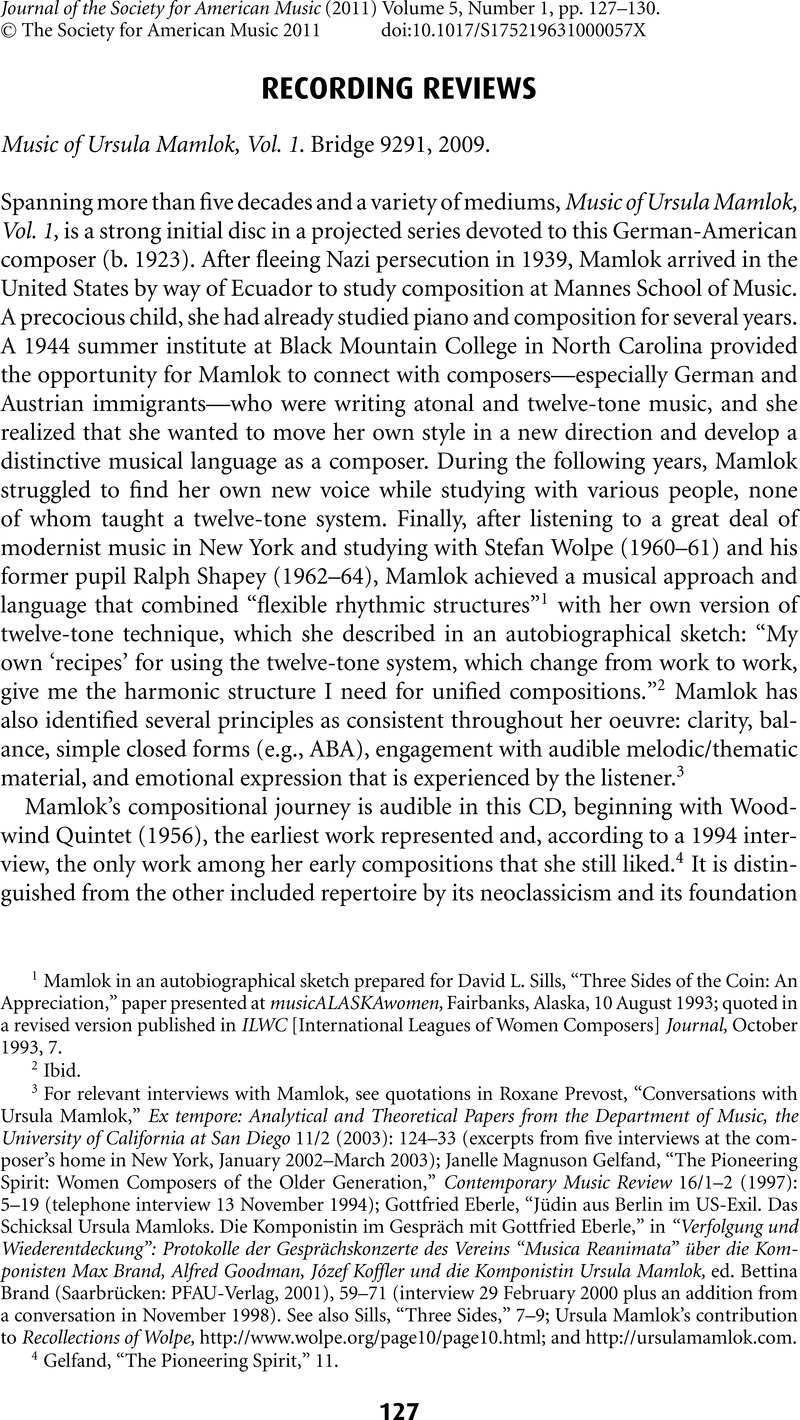No CrossRef data available.
Published online by Cambridge University Press: 21 January 2011

1 Mamlok in an autobiographical sketch prepared for David L. Sills, “Three Sides of the Coin: An Appreciation,” paper presented at musicALASKAwomen, Fairbanks, Alaska, 10 August 1993; quoted in a revised version published in ILWC [International Leagues of Women Composers] Journal, October 1993, 7.
2 Ibid.
3 For relevant interviews with Mamlok, see quotations in Prevost, Roxane, “Conversations with Ursula Mamlok,” Ex tempore: Analytical and Theoretical Papers from the Department of Music, the University of California at San Diego 11/2 (2003): 124–33Google Scholar (excerpts from five interviews at the composer's home in New York, January 2002–March 2003); Gelfand, Janelle Magnuson, “The Pioneering Spirit: Women Composers of the Older Generation,” Contemporary Music Review 16/1–2 (1997): 5–19CrossRefGoogle Scholar (telephone interview 13 November 1994); Eberle, Gottfried, “Jüdin aus Berlin im US-Exil. Das Schicksal Ursula Mamloks. Die Komponistin im Gespräch mit Gottfried Eberle,” in “Verfolgung und Wiederentdeckung”: Protokolle der Gesprächskonzerte des Vereins “Musica Reanimata” über die Komponisten Max Brand, Alfred Goodman, Józef Koffler und die Komponistin Ursula Mamlok, ed. Brand, Bettina (Saarbrücken: PFAU-Verlag, 2001), 59–71Google Scholar (interview 29 February 2000 plus an addition from a conversation in November 1998). See also Sills, “Three Sides,” 7–9; Ursula Mamlok's contribution to Recollections of Wolpe, http://www.wolpe.org/page10/page10.html; and http://ursulamamlok.com.
4 Gelfand, “The Pioneering Spirit,” 11.
5 Only Designs has been previously issued on a CD that is currently available and in a complete version: American Women Composers, Gasparo GS CD-300, 1995, performed by Catherine Tait (violin) and Barry Snyder (piano); Woodwind Quintet was issued on CD but is no longer available from the publisher: Never Sing before Breakfast: A Decade of New Music, Newport Classic NPD 85512, 1991, performed by the Quintet of the Americas; only the third movement of Concertino, “Elegy,” is included on Journeys: Orchestral Works by American Women, Leonarda LE 327, 1987, performed by the Bournemouth Sinfonietta and conductor Carolann Martin.
6 For further information about these composers, see Straus, Joseph N., Twelve-Tone Music in America (Cambridge: Cambridge University Press, 2009)Google Scholar, which begins with analyses of thirty-seven works by thirty-seven diverse American composers before moving toward a newly envisioned history of this music. Mamlok's Panta Rhei (1981) for piano trio is included (pp. 140–45), along with comments throughout the book about her individualistic approach to twelve-tone composition.